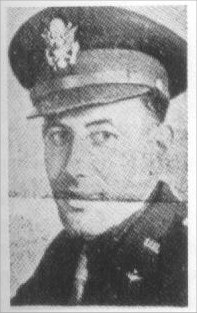Silver Dollar Brings Good Luck to Local Air Force NavigatorThe Silver dollar which 2nd Lt. Milton H. Halberstadt carries in his pocket for good luck brought him just that - it saved him from what would probably have been a mortal injury from flak. Lt. Halberstadt was the navigator aboard the bomber Texas Ranger, which, on April 3, (1944) ran into a heavy flak area on its way to bomb Budapest, Hungary. An unexploded flak shell came through the side of the plane just behind the nose turret, wounding the lieutenant. A silver dollar, in his pocket, was bent almost in half,and probably saved him from more serious injury. His right arm also was hit. The lieutenant is the son of Mr. and Mrs. Albert Halberstadt of 13 A Sparks Street, and the brother of the artist and photographer, Ernst Halberstadt of Coperthwaite Street. His wife, the formerMiss Olga Naratil, lives in Plainfield, New Jersey, and the story of the lucky silver dollar comes to us from the Plainfield Courier-News. Lieutenant and Mrs Halberstadt are the parents of a son Hans Milton born Leap Year's Day, Febrary 29, (1944) which the navigator has never seen. The flak, which caused Lt. Halberstadt's injury, continued on through the side of the Liberator, short-circuiting the electrical system, and finally hit and exploded in the #2 engine, puncturing the oil line. The only instruments left to navigate the ship were the magnetic compass and the altimeter. When he started to feel the ship losing altitude, the pilot, 1st Lt. Emil S. Laszewski of Depue, Illinois ordered the crew to bail out. Six crew members did, but T/Sgt. George L. Dancisak of Whiting, Indiana, engineer gunner, and the nose turret gunner, S/Sgt. Howard G. Kiefer, Franklin Square, Long Island, New York, still at his guns, remained. Sergeant Dancisak, excusing himself from not jumping when ordered said, "Someone threw my 'chute straps overboard while we were trying to decrease the plane's weight. Anyway, if we leave the ship, it means Lt. Halberstadt will have to crash with it. He could never ride a 'chute in his condition. I'll stick with the ship, sir." Sergeant Kiefer also was apologetic about not obeying orders. Explaining himself he said, "The interphone was out when the pilot first told us to jump and I thought we might run into some enemy fighters. Someone had to stay and help out a little." Sergeant Dancisak gave first aid to Lt. Halberstadt. "The lieutenant kept conscious all the way back. He even gave us a heading that helped us find our way. We still don't know how he did it because he lost a lot of blood. He's got plenty of courage. I guess he wants to get back and see that kid of his that he's never seen."The pilot said that the trip back seemed long and tedious. " We couldn't seem to get up any air speed and we had a long way to go. We salvoed our bombs but had to drop them through the jammed bomb bay doors." Lieutenant Halberstadt, formerly a photographer in Cambridge, enlisted in the Army six days after Perl Harbor, December 13, 1941, and was sent overseas January 2 (1944) of this year.According to letters from him received by his wife, he is now recuperating in a field hospital in Italy, and expects to be sent back to this country by June 1. The injury to his hands has resulted in the amputation of three fingers. | |
|
